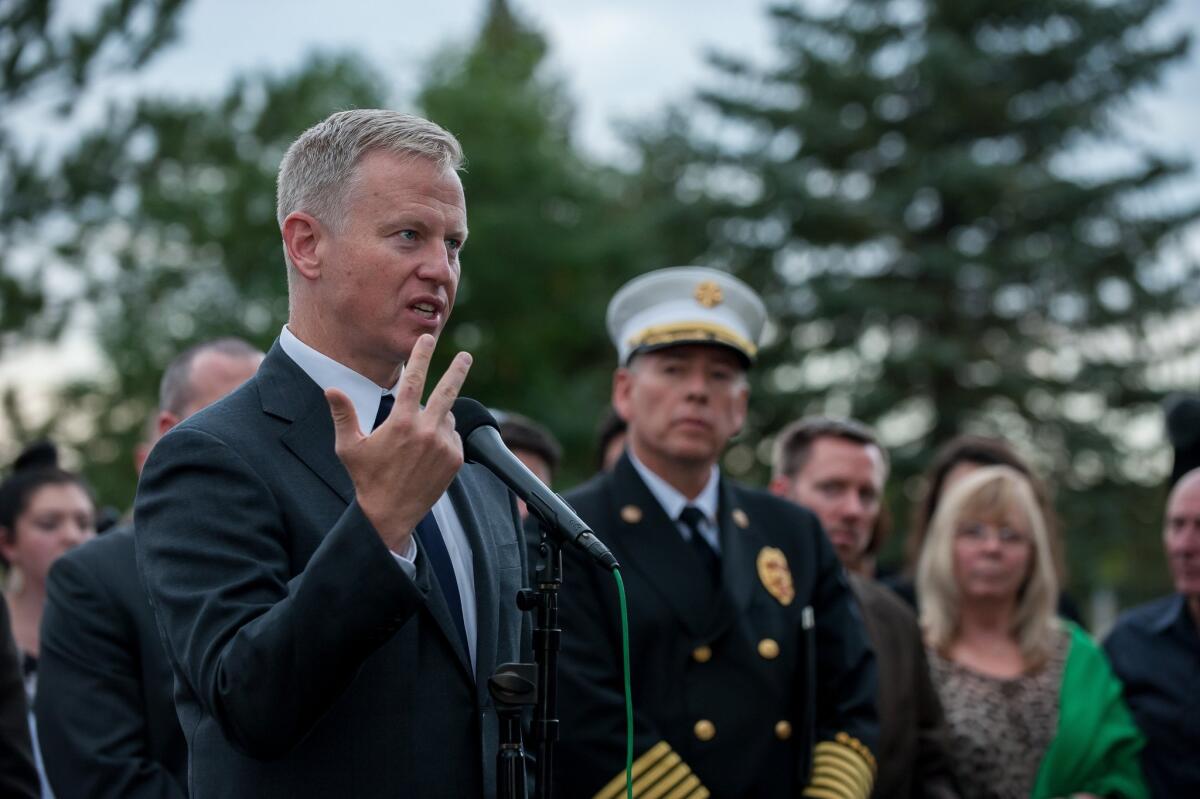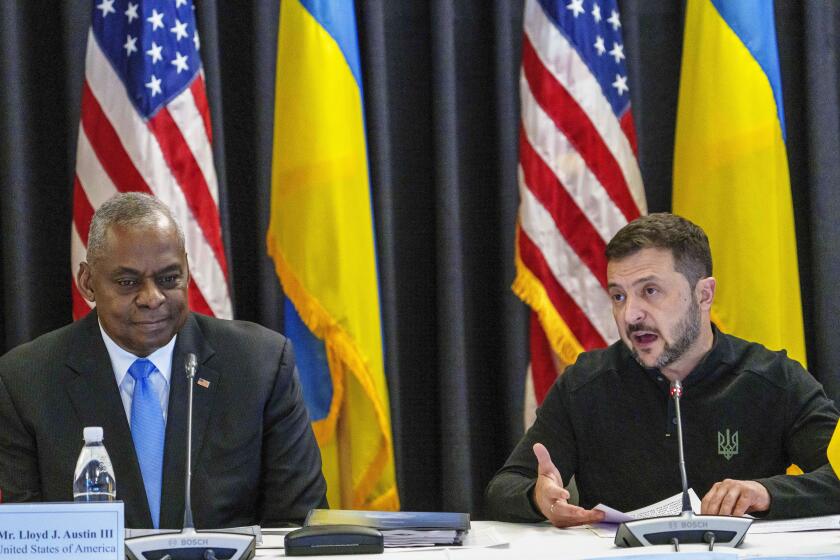‘Our lives are forever altered,’ victim’s mother says after James Holmes’ life is spared

Dist. Atty. George Brauchler speaks during a news conference after the sentencing verdict for James Holmes, for whom he had sought the death penalty. “I asked them to trust me and follow me,” he said of victims’ relatives and survivors of the shooting. “And I came up short, and that’s my fault, and that’s what hurts.”
One thing will not change, now that James Holmes is to be sentenced to life in prison without the possibility of parole for the bloody 2012 rampage that left 12 people dead and 70 others wounded.
Whether they wanted the gunman to live or prayed for his execution, survivors who lost loved ones in the chaos and horror of that warm summer night have been left with a gaping hole in their lives that nothing can fill.
“Our loved ones are gone,” Dave Hoover told reporters after the verdict was announced. “We will never get to hug them again. I will never get to hug A.J. and tell him I love him again.”
Hoover’s 18-year-old nephew, Alexander “A.J.” Boik, was murdered by Holmes three years ago. Since the massacre, Hoover’s mother also died.
The doubly grieving Hoover talked only obliquely Friday about the verdict and its impact on victims and survivors. Kindness and hope were more on his mind than justice or vengeance.
“What we have to remember is we could not have gotten through any of this without the kind words and love and support of everyone,” he said. “We are here together because we love, respect and care about each other, even if we don’t agree with each other.”
But the grandfather of the littlest victim to die on July 20, 2012, was far less sanguine. Standing outside the Arapahoe County Justice Center in Centennial, Colo., Robert Sullivan wondered aloud whether the man who murdered 6-year-old Veronica Moser-Sullivan “may be killed in prison.”
Holmes, who pleaded not guilty by reason of insanity, planned the rampage for months and swathed himself in body armor before he lobbed tear gas canisters into the packed theater and began blasting away. He was convicted last month on 165 counts including first-degree murder and attempted murder.
On Friday, the jury announced that it could not reach a unanimous decision about whether the 27-year-old former neuroscience student should be executed. As a result, Holmes will spend the rest of his life behind bars.
Holmes “would have preferred a mental institution,” Sullivan said. “He preferred life over death. I wondered in the interim if he would have committed suicide, but he doesn’t have the guts, the fortitude, to do that. He armored himself up.”
Sullivan said that he’s “tried to resolve Veronica’s death, and I can’t. It was the gaping wound that’s not going to go away. This just makes it worse.… I imagine some of those jurors felt betrayed, too.”
Attorneys did not ask Judge Carlos A. Samour Jr. to poll jurors after the verdicts were read, so there was no official count of how the jury split on the question of death for Holmes.
Court spokesman Rob McCallum said on Twitter after the verdict that “none of the jurors wish to speak with the media today.”
But on Friday evening a woman who identified herself as Juror 17 talked briefly with reporters, disclosing that one juror was a holdout, and two others wavered on the appropriate sentence for one of the worst mass shooters in American history.
According to the Denver Post, Juror 17 identified herself only as a real estate contract attorney and would not disclose her name or her own vote.
But she described the holdout as “genuine” and called the experience of being on the jury “life-changing.”
Holmes’ parents, who testified at their son’s trial, said through an email from their attorney that they are “unable to make any comment at this time other than to say that they are deeply sorry this has happened and they are so sorry that the victims and families have suffered such tremendous loss.”
On Saturday, a former classmate of Holmes reflected on the life sentence.
Patrick Silva, 27, a chiropractic intern at Palmer College of Chiropractic’s San Jose campus, had played recreational basketball and high school soccer with Holmes in San Diego and served as a character witness in the sentencing phase of the trial.
Silva said in an interview that he traveled to Colorado to testify “because I wanted to tell a story to the jurors that there was a very distinct difference between how he [Holmes] started and how this is ending. My hope was that someone more intelligent than me could figure out how that change happened.
“Because he doesn’t have the death penalty I really hope he spends the rest of his life trying to make up for what he did,” Silva continued. “That would be really the only appropriate thing, just to give and give and give, and he can probably never give enough … but there’s something to be said for trying.”
The family members of those killed and the survivors of the rampage were split about whether they supported seeking the death penalty for Holmes.
But they were not split on how they felt about Arapahoe County Dist. Atty. George H. Brauchler, the man who made the final decision and ultimately fought to have the gunman executed for his crimes.
“We have said from the beginning that we didn’t care what the verdict was at the end, and that remains true,” said Sandy Phillips, who was wrapped in a bright green scarf that belonged to her slain daughter Jessica Ghawi, age 24.
“I’m really glad we went through this process. I’m grateful for the leadership of George Brauchler,” she continued. “I hope he becomes a Democrat so I can vote for him in the future.”
Phillips laughed and then turned serious again. The families, she said, will have to accept the jury’s decision, no matter how difficult that might be.
“Our lives are forever altered,” she said. “The thought that this monster gets to have visitation with his parents and gets to receive mail and pictures of his very strange girlfriends is very hard to accept. But that is what it is.”
And Brauchler?
He sat stony and silent in court as Samour read the verdict slips. Speaking to reporters later, he apologized to the victims’ families.
“I asked them to trust me and follow me,” he said. “And I came up short, and that’s my fault, and that’s what hurts…. You can take failure for yourself better than you can take it for others. I failed for others.”
He said the prosecution posted up against a “well-funded, very experienced” defense team. And he said that no one should fault the jury, because “this is a matter of extreme justice,” and its members voted from their hearts.
“This is a decision of the community,” he said. “The jury made that decision. I will respect and live with that decision.”
Times staff writers Matt Pearce and Matt Stevens in Los Angeles contributed to this report.
Follow @marialaganga for national news
More to Read
Sign up for Essential California
The most important California stories and recommendations in your inbox every morning.
You may occasionally receive promotional content from the Los Angeles Times.











